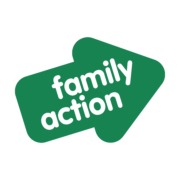In response to the Government’s recently published SEND and Alternative Improvement Plan and to mark Neurodiversity Celebration Week (13th – 19th March 2023) we are re-sharing some stories from Family Action’s SEND services.
It can be a challenging getting a diagnosis for a neurodiverse child with Autism or Special Educational Needs, with this only being the start of an often complex and daunting journey. We spoke to mum, Ella about her daughter’s Autism diagnosis, the events leading up to it and the struggle that followed.
I’d always known my daughter was different since she was very young: there was something nagging at me. Now I know she has high functioning autism but if you’d told me then that’s where this journey would lead I wouldn’t have believed you. Even as someone who had studied at college managing children with different educational needs, I was still shocked when she was diagnosed.
We’d had problems with her behaviour; always at home. She was as good as gold in school – really academic – but when she got home she would just explode. There would be door slamming and stamping of feet and she would lash out at her younger siblings and become physically violent towards me. It was as if everything which happened at school came out when she got home – like she took a mask off and said ‘now I can be me’.
I didn’t know how to handle it and I didn’t know what to do but I realised I needed help, so I referred myself to children’s centres and other support services. But they pointed me in the direction of parenting courses which I found quite demoralising because it felt like they weren’t addressing the behaviour and were shifting the focus onto me instead.
I also contacted my daughter’s school on numerous occasions but they couldn’t help because they didn’t see that behaviour when she was there. Nobody believed me. Nobody else saw what I saw and I felt very alone.
Things came to crisis point when she was seven and took a knife out of the kitchen drawer and threatened to take her own life. I knew this was unusual behaviour for a seven-year-old but what I didn’t know was that in the background there had been a bullying incident which neither I nor the school were aware of.
My daughter just didn’t know how to deal with it and the knife incident was her way of saying “I don’t want to go to school today”. It was her way of screaming very loudly to be heard.
Finally, she was referred for a diagnosis where we were told she has high functioning autism and sensory processing disorder. Initially it was a huge relief; somebody had recognised my daughter was struggling and it wasn’t all in my mind. I thought the moment she was diagnosed that would be it and she’d get the help she needed. I didn’t realise immediately that it meant we had been moved to the bottom of a long list of people needing support.
Since then it has been a battle with her school, who did not want to refer my daughter for an assessment for an education, health and care plan (ECHP), which would allow her to get specific support in school. I want her to have a safe space and support there to allow her to blow off steam and process the day so she can come home and not explode when she gets here. I’d also like the plan in place for when she moves up to secondary school as the transition will be especially difficult for her.
My daughter has a reading age of 20 and she is excelling in all subjects, but particularly reading and writing. She was getting frustrated at school because she is so far ahead educationally, and I’d like the EHCP to ensure she’s challenged academically so she doesn’t come home feeling like that.
She has now come to the point where she does not want to hear the word autism. She desperately doesn’t want to be different. She is very good at ‘masking’ at school but it is exhausting for her to keep that up all day long.
When she was diagnosed I almost felt as if I was grieving a little bit because I had my own hopes and aspirations for her which now might not materialise. Her life will take a different path.
I just want her to be happy. I would not change her; I can’t change her. I have come to realise I am the one who needs to change and that hasn’t been an easy journey.
Family Action have been incredible and were the only charity to offer us real, practical support with the complicated paperwork needed for an appeal. Jenny, from Medway Small Steps, has been so supportive and understanding, and I now know I am not alone in this battle. Their support with completing the forms I needed to appeal the local authority’s decision not to complete an EHCP assessment made all the difference. They have always been friendly, supportive and understanding.
If there are any parents out there struggling with a similar situation I would say trust your instincts: they’re usually right. And never stop asking for help. You have to fight for your child’s sake.
Read our Response to the Government’s SEND and Alternative Provision Improvement Plan and find out more about our vision of support for families of children with special educational needs.
If you need support or you’d like to talk through any issue relating to special educational needs or disabilities, please call our FamilyLine free.








